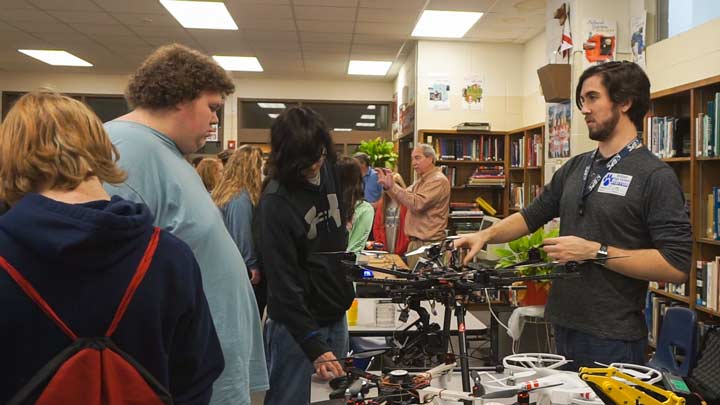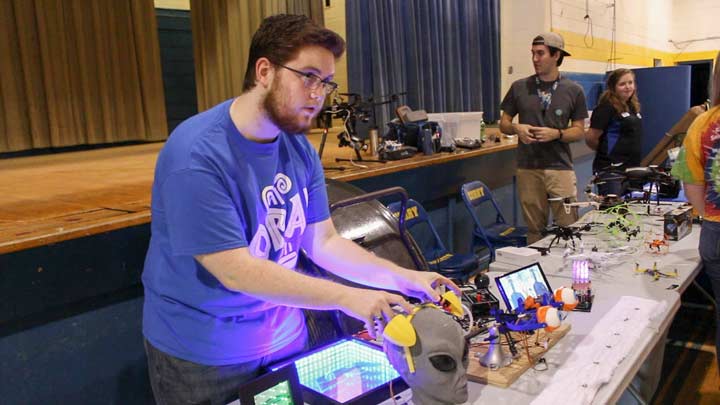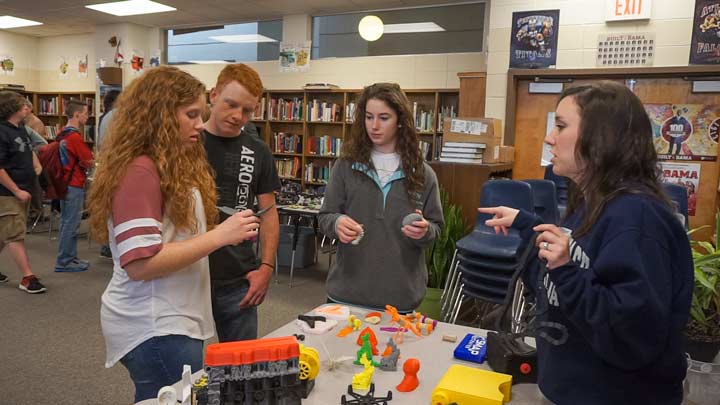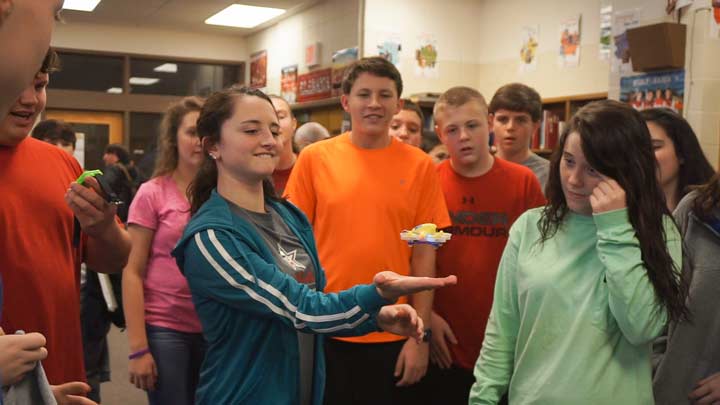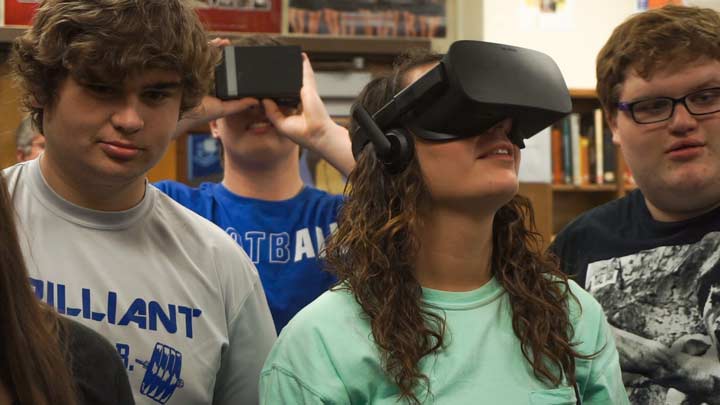UAH’s SMAP Center seeks to build interest in STEM careers among Alabama’s youths
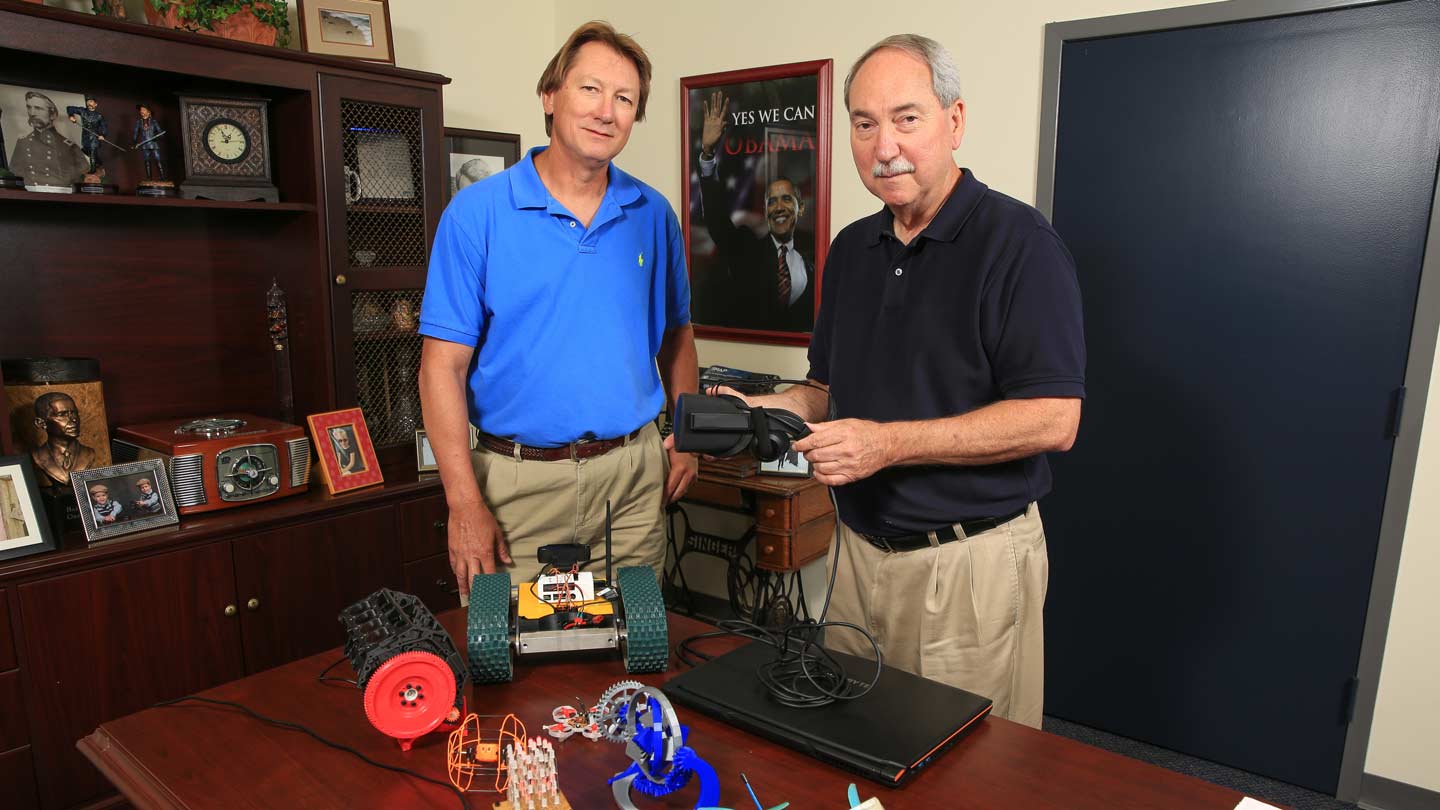
Dr. Gary Maddux, director of UAH’s SMAP Center, and Norven Goddard, a SMAP Center research scientist, have spent the last few years creating a culture that encourages Center staff to give back to the state through educational outreach.
By any measure, UAH alumnus Dr. Gary Maddux has enjoyed a successful professional career, culminating in his present position as director of the university’s Systems Management and Production (SMAP) Center. But he hasn’t forgotten his roots as a boy growing up in Jackson County, which like many rural areas of Alabama offers youths limited access to and participation in the science, technology, engineering, and math (STEM) fields. So a few years ago, he partnered with SMAP research scientists Norven Goddard and Dr. William Sabados to create an outreach program dedicated to building interest in STEM careers among the state’s youths.
"Our Center’s mission is to conduct research and support the U.S. Army, but we have some discretionary funds, so we have chosen to invest those in giving back to the region and the state through outreach," says Dr. Maddux, who still lives in his hometown of Scottsboro. "I call it a ‘formalized informal’ system, a sort of loose affiliation with a lot of schools from the elementary to the college level, that grows by word of mouth. And we have done it for so long now that our schedule already goes well into 2018 – and we’re still adding to it!"
The program’s earliest iteration tended toward more individual efforts, with undergraduate students employed at the SMAP Center returning to their old high schools to meet with their near-peers and show them what they were working on. Over time, however, it has evolved into what is now known as the STEM Road Show, where the Center’s research staff travels to schools in rural counties throughout the state to display emerging technologies and promote STEM education. "We started out in the high schools and junior colleges, but now we’re pushing down into the kindergarten arena," says Dr. Maddux, who credits his wife Kita, a retired English teacher, with encouraging him to "build a good foundation" among the state’s youngest residents.
The result is an 18-year pipeline that begins with Club Wildcat, an after-school program for K-6 students in the Scottsboro City school district. "The kids’ teacher came to us and said ‘I want something that will keep these kids engaged without knowing they’re learning,’ and so we developed this pilot program," says Mr. Goddard. "It offers a fun atmosphere to expose these kids to simple STEM lessons, such as squishy circuits, static electricity, and LED technology."
At the middle and high school levels, students are introduced to the STEM fields through not just the STEM Road Show, but several other programs as well, including:
- Realizing Alternatives and Multiple Paths by Unlocking Your Potential (RAMP UP) – RAMP UP provides project-based learning experiences that ensure portability, flexibility, and compatibility with state course of study standards.
- High-Altitude Balloon Satellite (HABSat) – Participants in the HABSat program study the science behind these specialized balloons, with students in each grade level assigned a specific focus that is ultimately integrated into the whole experience.
- GenCyber Cybersecurity Summer Camps – Jointly funded by the National Security Administration and the National Science Foundation (NSF), these camps are open to students (including those who are deaf and hard of hearing) and public school teachers.
- Innovative System Project for the Increased Recruitment of Emerging STEM Students (InSPIRESS) – Administered by Drs. P.J. Benfield and Matt Turner, principal research engineers at the SMAP Center, InSPIRESS challenges high school students to develop and design a scientific payload for a spacecraft designed by undergraduate students in UAH’s Integrated Product Team class, which the pair also teaches.
At the college and graduate level, the Center offers STEM employment opportunities through its Students Working at the Army in Parallel (SWAP) program. "The SWAP program is an ongoing effort to hire the best and brightest students from across the region, regardless of where they’re studying, and mentor them as they pursue a career in the STEM fields," says Dr. Maddux, adding that those same students are often enlisted to participate in the Center’s outreach trips. "We give that younger group experience and training so that, when they get to Redstone Arsenal, they’re ready to go." Since its inception, over 600 students have gone through the SWAP program, with the vast majority finding employment with the Army or another government contractor after graduation.
Concurrent with all of this, the Center’s research staff is conducting a three-year, NSF-funded "State of STEM" project that will help determine methods to improve STEM education in economically distressed regions of Alabama, with an emphasis on school systems in the state’s Black Belt. "We are a state of ‘haves’ and ‘have nots,’ so we want to go to those rural counties and work with school systems that do not have the resources we have here in Madison and Huntsville," says Dr. Maddux. "And there are a bunch of hungry kids in this state who need jobs. If you want to go to Pickens County or North Jackson High School, you’ll find we don’t have any shortage of talent."
Should these rural residents eventually end up as students at UAH – and employees at the SMAP Center – that would be a welcome outcome. But that’s not the metric that Dr. Maddux himself is using to gauge the program’s success. "We just want more people fired up about STEM education and interested in pursuing careers in the field," he says. "We can’t know how many kids will be inspired to do that as a result of our efforts, but you don’t worry about that. You just have to be patient and wait, and 20 years from now, some young person will come up to us and say, ‘I remember when you came to our middle school and talked about drones, and now I just graduated with my degree in engineering.’ You don’t plant apple seeds and get apples the next day."
Gallery
Contact
Dr. Gary A. Maddux
SMAP Center Director
256.824.2679
gary.maddux@uah.edu
